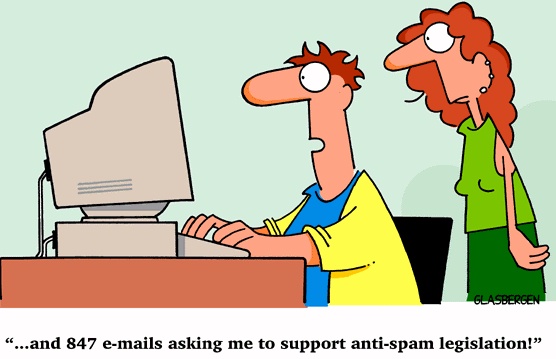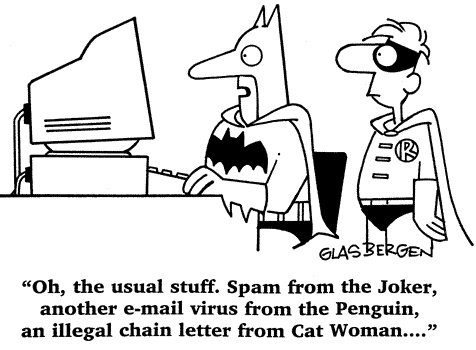|
|
|||||||||||||||||||||||||||||||
|
Canada a Haven for Spam
Lawmakers failing to Act against Canadian Spammers By Angela Marx - December 2008. Canada has numerous companies engaging in spam. So much that Canada ranks 5th in the world behind Iran, Nigeria, Kenya, and Israel. That means Canada is a bigger spammer than even China. So why does Canada have so many spammers? Its simple. Canada is the only G7 country that DOES NOT have strong anti-spam legislation. In November 2008 a California court awarded social networking giant Facebook $873 million (U.S.) in damages arising from the activities of a single spamming organization. The decision garnered headlines in Canada because the spammer targeted in the lawsuit operates out of Montreal.
Facebook acknowledges it is unlikely to recover much of the awarded damages, the case has put the spotlight on Canada's failure to introduce long-overdue antispam legislation. The fact that organizations are forced to use United States laws and courts to deal with Canadian spammers points to an inconvenient truth Ð Canadian antispam laws are woefully inadequate and we are rapidly emerging as a haven for spammers eager exploit the weak legal framework. Some anti-spam activists argue that the USA needs more than just a fine and that mandatory prison time should be part of the punishment, similar to white-collar fraud. Then Canada could extradite criminals to the USA to face trial. Canada initially recognized the need to address the spam issue in 2004 with the formation of a National Task Force on Spam that included a broad cross-section of marketers, telecom companies, and public policy groups (I was a member). The task force unanimously recommended the government introduce antispam legislation. Years later, the issue continues to languish on the legislative agenda. Successive governments Ð Conservative and Liberal Ð have failed to introduce legislation (the notable exception is a private member's bill introduced by Senator Yoine Goldstein earlier this year).
During this fall's election campaign, Stephen Harper's Conservatives promised to address the issue, yet a commitment to antispam legislation was missing from the government's forthcoming priorities outlined in the recent Speech from the Throne. Evidently Harper doesn't care enough about the issue. The continuing delays are particularly problematic given the increasingly criminal nature of spam. Once regarded as just a nuisance, the recent flood of spam spoofing the Canada Revenue Agency that encouraged recipients to forward sensitive personal information highlights the real dangers of identity theft that can result from spam activities. The Facebook case is just the latest illustration that government inaction has had an impact. Companies anxious to target Canadian-based spammers have been forced to turn to other countries to do the job, while international law enforcement investigations into criminal spam run the risk of stalling in Canada since authorities may lack the requisite investigatory powers. As the only G7 country without antispam legislation, it was only a matter of time before spammers began to take advantage.
Antispam software company Cloudmark recently presented data on the origins of spam from web-based email providers such as Hotmail, Gmail, and Yahoo at an international antispam conference in Germany. Its research indicates that the majority of email Ð often up to 80 per cent Ð from these popular services is now spam. Another recent study from California demonstrated how spammers profit by shifting the costs traditionally borne by marketers to the recipients of spam, namely Internet users. Although many people immediately delete spam messages, the study found spammers remain profitable even with very low response rates. In light of its profit-making potential, no amount of antispam legislation will completely eliminate the problem. However, the experience to date in other countries has shown tough new measures can reduce the amount of spam that originates from domestic sources.
Given the fact there are still several major Canadian spamming organizations that are thriving under the current legal framework, the best way to reduce the amount of made-in-Canada spam is to change the law. Given the option... I'd like to find these Canadian "spamming organizations" and take a crowbar to their computers and god-help-me I don't kill a few of them. If the Canadian lawmakers like Stephen Harper are too stupid to punish these miscreants its time Canadians took the matter into their own hands.

|
|
||||||||||||||||||||||||||||||
|
Website Design + SEO by designSEO.ca ~ Owned + Edited by Suzanne MacNevin | |||||||||||||||||||||||||||||||










